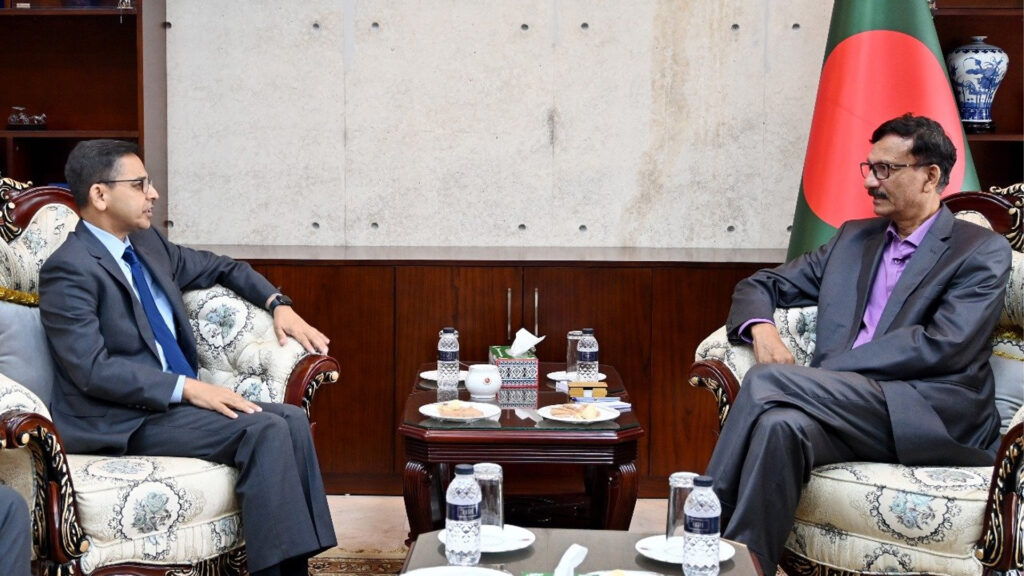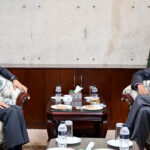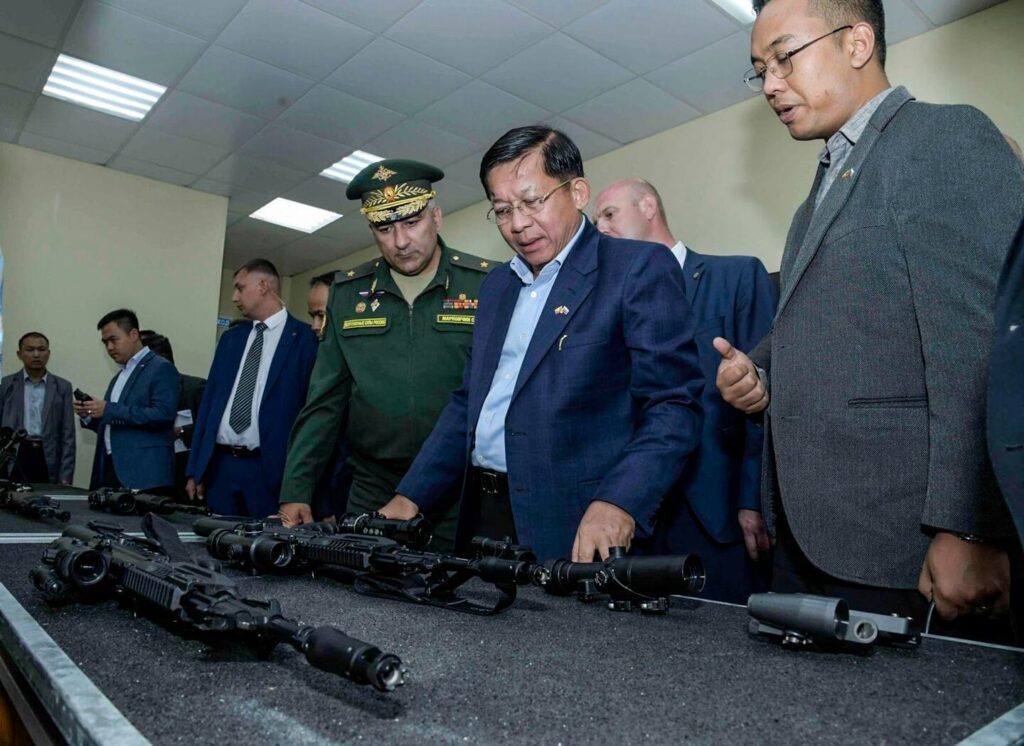MANTRAYA ANALYSIS# 84: 17 FEBRUARY 2025
BIBHU PRASAD ROUTRAY
Abstact
The act of waiting and watching doesn’t hold much attraction to foreign policy watchers. However, sometimes, a nation’s best interest is served by patience. In the post-Sheikh Hasina Bangladesh, New Delhi is faced with a predicament. It cannot oblige the demands of the Interim Government to extradite Hasina. And without resetting the ties, Bangladesh could drift away from New Delhi’s arc of influence. In this context, exercising patience could provide New Delhi with an opportunity to pause, allowing Dhaka to navigate its pressing internal challenges.

(Indian High Commissioner Pranay Verma with Bangladesh Foreign Affairs Adviser Md Touhid Hossain on 2 October 2024. Photo Courtesy: Somoy News)
Extraditing Hasina
Dhaka is doubling down on its quest to get the former Prime Minister Sheikh Hasina extradited from India. Buoyed by a fact-finding report by the UN Office of the High Commissioner for Human Rights (OHCHR) which blames the erstwhile Awami League (AL) government for the extrajudicial killings of protesters on the streets of Dhaka in July and August 2024, the Interim Government reportedly has submitted documents asking New Delhi to send Hasina back to face trial.
India, which has stood firmly by the side of its former ally, isn’t expected to entertain any such request. However, declining the request or keeping mum comes at a cost for New Delhi and its neighbourhood policy. Providing a haven to Hasina and allowing her to periodically deliver online speeches has already expanded the anti-India baiters in Bangladesh. Its critique of the Interim Government’s failure to protect the religious minorities, Hindu places of worship, and the house of Hasina’s father and father of Bangladesh nation, Sheikh Mujibur Rahman has created a gulf between the IG and New Delhi. While New Delhi has the option of acting like a proverbial big brother and ignore Dhaka’s sensitivities, the danger of Bangladesh slipping away from India’s arc of influence can become a reality.
Indian Concerns
It isn’t rare for India to discuss state affairs in its neighbourhood with its allies and friends. Pakistan and China have often figured in such consultations with the United States and the Quad members. The obvious purpose is to make the policies of those countries align with that of India’s, although not always with a great degree of success. However, for New Delhi, it is rare to publicly admit that a particular country figured in such bilateral discussions. Such rarity was, however, breached on 23 January. Foreign Minister S. Jaishankar, visiting Washington D.C. as the Indian prime minister’s special envoy to attend the inauguration of President Trump, told media persons at the Indian embassy that he raised the issue of Bangladesh with the American Secretary of State, Marco Rubio and National Security Adviser, Mike Waltz.
Minister Jaishankar didn’t elaborate. However, given that the confirmation was in response to a media query regarding the state of minorities in Bangladesh, it may not be difficult to speculate what transpired during the meetings.
Ever since the collapse of the AL government, the retributive mob consisting of students, extremists, and opportunist criminals targeting the Hindu minorities in Bangladesh who are considered to be supporters of the party, has been criticized by New Delhi. The latter has repeatedly called for their protection, albeit to no avail. A wave of anti-India sentiment has seemingly enveloped Bangladesh. Even the statements of the members of the Interim Government have fanned such sentiments. The Indian Ministry of External Affairs (MEA)’s repeated assurances that it desires “a positive, constructive and mutually beneficial relationship with Dhaka” have few takers in that country.
New Delhi has reasons to believe that attacks on the religious minorities were a byproduct of the larger space now available to the radical Islamists in the country to operate with a sense of impunity. Incidents have ranged from attacks on Hindu places of worship across the country to stopping women from playing a game of football. These indicate that the Islamists, who had been kept under check by the AL government, not only sense an opportunity to advance their agenda, they are doing so under some degree of patronage from the Interim Government. While statements of most of the Interim Government’s advisers have been consistently anti-Hasina, they have remained completely silent on this strengthening of the radicals. The unchecked growth of Islamist radicalism in India’s neighbourhood can be a matter of huge concern.
Further, while the MEA hasn’t commented on it, what also alarms India in the security sphere is the Interim government’s attempts to forge strong ties with Islamabad, reversing the decade-old policy of the AL government. Members of the Interim Government have downgraded the key role India’s played in Bangladesh’ war of liberation to that of an ally, and nothing more. On the other hand, the Pakistan embassy in Gulshan-II area is abuzz with activity, coordinating several high-profile visits of army, ISI officials and businessmen to Dhaka, and arranging cultural shows of Pakistani artists. Indo-Pak relations in most theatres are a zero-sum game. India’s influence in Dhaka had risen during the AL regime. However, the rapid rise of Islamabad’s profile, even when the opposition Bangladesh Nationalist Party (BNP) isn’t in power, has come as a surprise to New Delhi.
India’s Policy
Jaishankar discussing Bangladesh with NSA Rubio is probably an indication of India’s frustration of being unable to control the unfolding events. Alternately, publicly admitting that discussion took place, could also have been a pressure tactic, to achieve what could not be achieved through a combination of policy of accommodation and muscle-flexing.
The beginning of the phase of policy can be traced to the hospitality New Delhi extended to a fleeing Hasina. The expectation at that time probably was that India would not be her permanent place of residence. However, negotiations to relocate her to a third country did not materialize. Since then, calls for her extradition to Bangladesh by the Interim Government officials have grown in frequency and shrill. The press secretary to the Chief Advisor has regularly called her using different synonyms of the word ‘autocrat’.
The first phase of New Delhi’s policy, after emerging from the state of shock, was that of outreach. While it seemed to have advised Hasina to keep mum, the Indian ambassador reached out to the Interim Government on multiple occasions. He assured that India, despite providing a shelter to Hasina stands with the people of Bangladesh and intends to maintain its strong ties with Dhaka. Continuing India’s outreach, India’s foreign secretary visited Dhaka in December 2024, met the Chief Advisor, and reiterated India’s concern about the state of minorities in Bangladesh. In response, Chief Advisor Muhammad Yunus, who described Indo-Bangladesh relations as ‘strong’, also raised the issue of Hasina’s stay in India.
However, responding to the unceasing attacks on the minorities and Dhaka’s growing proximity with Islamabad, which were interpreted as an undeterred Interim Government unveiling its policies directly challenging India, New Delhi lifted the embargo on Hasina, letting her vent out on online forums. The revised policy probably concludes that India-Bangladesh relations won’t be the same again without the AL at the helm of affairs. Hence, it seeks to use her to activate the persecuted AL cadre base in Bangladesh. Such a policy is fraught with risks, but a gamble New Delhi possibly considers every penny’s worth to force the Interim Government to deal with a country-wide instability.
So far, it has been a game of wits between Dhaka and New Delhi. Hasina’s online speech that targeted the Interim Government was matched by a ‘bulldozer march’ in the heart of Dhaka, which appeared spontaneous, but clearly could not have been organized with the authorities looking the other way. With the security forces choosing to disappear from the scene, ‘agitated students’ gathered in Dhanmondi 32 in front of the house of Bangladesh’s father of the nation and Hasina’s father, Sheikh Mujibur Rahman and used a bulldozer to bring the national monument down. Similar incidents of defacing Mujib’s statues and attacks on the houses of AL leaders were reported from various parts of the country. The Interim Government did little else other than feebly criticizing the act, indirectly blaming Hasina for stoking the anger of the people of Bangladesh. While Dhaka summoned India’s deputy chief of mission to object to Hasina’s speech, New Delhi returned the favours by protesting the “persistent negativity” created by the administrative leadership’s statements in Dhaka.
Costs on India
Indian media and analysts have mostly commented on the cost of the frozen bilateral relationship by pointing at its impact on Bangladesh economy. Factors like political unrest, floods, labour unrest and shutting down of factories have resulted in the country recording low growth in agriculture, industry and service sectors in the aftermath of the collapse of the AL government. In November 2024, overall inflation stood at 11.38 percent, marking the second-highest level in the last 14 years. Although it eased to 9.94 percent in January 2025 due to stable food prices, it was too high for a developing country with a huge mass of poor people.
The unrest has affected India as well. India is Bangladesh’s largest export destination in Asia and Bangladesh is India’s eighth-largest export destination. However, the worsening of ties has sought to disrupt this. Indian exporters were apprehensive of delayed payments for their shipments and this resulted in a significant drop of exports to Bangladesh.
Another Indian sector to have been affected is medical tourism. In the aftermath of Hasina regime meltdown and widespread unrest in Bangladesh, India restricted the number of visa it used to issue from its High Commission and consulates. While this can be understood as a punitive measure directed at Dhaka, this affected India’s medical tourism sector valued $7.69 billion in 2024. This sector attracts 2 million patients annually from 78 countries, including Bangladesh, Afghanistan, Pakistan, and African nations. Of these, Bangladesh, according to estimates, accounts for almost 50 to 60 percent. Footfalls in major hospitals fell by 20 to 40 percent. This issue has sought to be addressed by India’s budget 2025, which may lead to a restoration of the number of Bangladeshi patients and tourists visiting India. Apart from historical and cultural connect, economic interdependencies between the two countries lie at the core of the Indo-Bangladesh bilateral relations. Any decision to disrupt that can be potentially uneconomical.
Thaw in Offing?
The performance of the Interim Government with Muhammad Yunus at the helm in Bangladesh, which has a self-proclaimed role of reforms without a clear time frame, especially on the law and order front, has been poor. While legal Actions have been initiated against the AL leaders and members, and anybody seen as sympathising with the erstwhile Hasina regime, the arsonists, who are mostly the students of various colleges and universities, continue to operate with impunity. The Interim Government, which owes its existence to a violent student movement, feels obliged not just to cater to their demands, but also to ignore their organised acts of violence. In the name of bringing the law and order situation under control, the Interim Government has started a special drive ‘Operation Devil Hunt’ on 8 February 2025. However, the drive is unlikely to target anyone other than the AL members across the country. Anti-AL sentiments are all pervasive, albeit justifiably. But no attempt is being made to prevent the state of affairs lapsing into a specter of chaos in which anti-Indian Islamists calling the shots. The Interim Government continuing to link Hasina’s extradition to Bangladesh with improving ties with India makes the bilateral relations a non-starter, to begin with.
In this backdrop, New Delhi’s current options in Dhaka are limited. Neither is it in a position to satisfy the demands of the Interim Government to extradite Hasina, nor is it able to forge ties with any political entity in that country, as long as it hosts Hasina on its soil. Hasina’s statements are likely to further worsen the conditions of anyone in Bangladesh considered to be her ally or sympathiser—be it the AL workers, the religious minorities, or the members of the civil society and the press.
The current bleak situation in Bangladesh does not necessarily mean that the future is hopeless for India. The final endgame in Dhaka is yet to fully unfold. The Interim Government’s eagerness to carry out reforms and postpone elections indefinitely will likely clash with the political ambitions of a restless BNP. As the economy stagnates, both the leaders in Dhaka and the students protesting in the streets will eventually realise the futility of trying to replace India with an economically struggling Pakistan. New Delhi can afford to wait and observe as Bangladesh struggles with its challenges until it reaches a breaking point. The state of turmoil is bound to produce rational leaders in that country who would discover the wisdom of extending a hand of friendship towards New Delhi.
(Dr. Bibhu Prasad Routray is the Director of MISS. This analysis has been published as part of Mantraya’s ongoing “Fragility, Conflict, and Peace Building” project. All Mantraya publications are peer-reviewed.)




